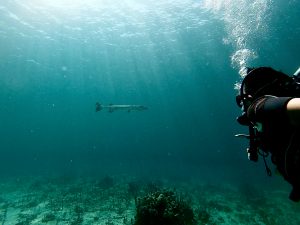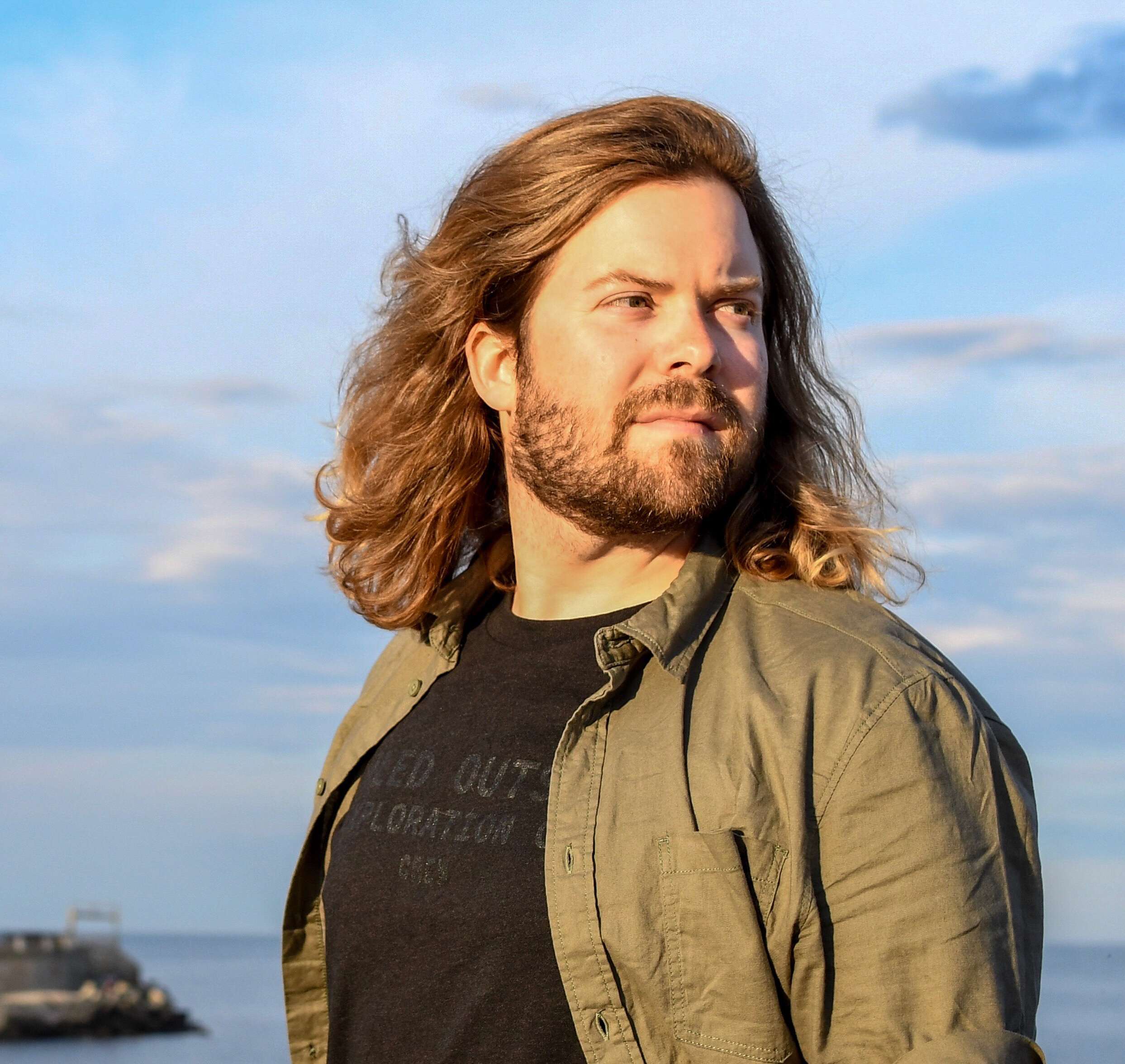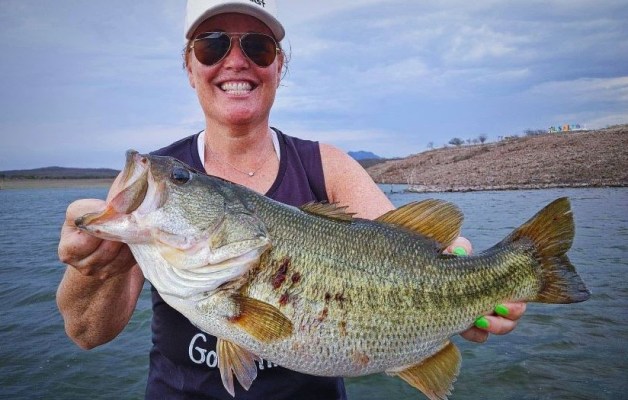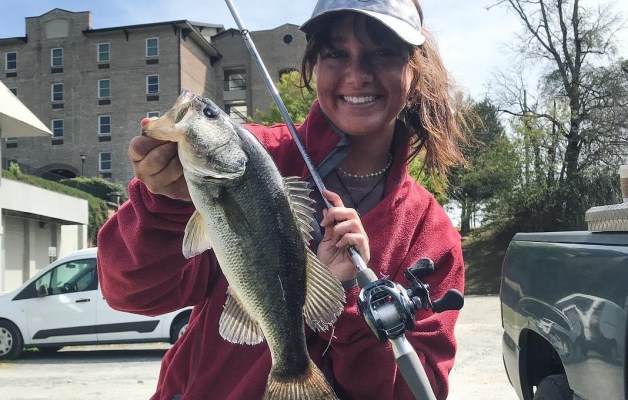
The old man sat beside me under the thatched roof for hours. Beneath the glow of the Fijian moon, he drained heavy pours of red wine and told me the story of his life; it was one of adventure beneath the waves. He’d seen underwater volcanoes and the glow of the cold sun above sea ice. He’d been encircled by hundreds of hammerhead sharks and found joy in the tiny, nearly microscopic animals hidden inside of the planet’s coral reefs.
For decades, Don Santee had been a divemaster for the Cousteau family. In the world of underwater exploration, he was a legend. And I — a burgeoning travel writer from the landlocked city of Memphis — was about to receive a terrifying gift. “I’m glad you wrote all of that down,” Santee said. “Now, you can’t print a word of it unless you meet me on the bottom of the ocean tomorrow.”
Thus began my journey into the world of scuba diving, a hobby that sent convulsive chills down my spine until that fateful assignment in Fiji. In the ensuing years, I’ve followed in Santee’s footsteps by investigating coral reefs, shipwrecks and undersea geology for myself. And the journey to get there was surprisingly easy once I made the decision to commit.
A dive certification can allow you to rent scuba gear from thousands of dive shops around the globe, from famous sites like the Great Barrier Reef to more obscure locations like the prehistoric caves of Brazil. Here’s how to snag one for yourself.
Go On A Discovery Dive
Scuba certification is a serious process that requires time and commitment. You’ll most likely be aiming to earn a certification from PADI, a dive organization that operates in 186 countries and certifies more than a million divers each year. The tradeoff for your hard work is an open door to a breathtaking natural world that only a fraction of humans on this planet get to see.
Unless you happen to be on holiday for an extended time at a dive resort, chances are your journey to earning a certification, like the PADI Open Water card, will take several weeks. However, there is a shortcut to getting underwater quickly so you can decide whether or not diving is for you.
A PADI-certified professional can take you on a Discover Scuba experience where you will take your first breaths underwater, learn to communicate while submerged and perform some basic scuba skills. While underwater, you are never more than an arm’s reach away from a trained professional who can assist you if any unexpected events occur.
The dive Santee arranged for me in Fiji was exactly this. During one day, I went from learning how to operate scuba gear in a pool to diving in the open ocean down to about 30 feet. That was enough to get a glimpse of the incredible coral reefs of Fiji and lead me toward becoming a certified diver.
Most dive shops, especially in resort areas like Central America, the Caribbean and the South Pacific, offer experiences like these.
Find A Reputable Dive School
If you decide diving is a lifestyle for you, seek out a reputable dive school in your home waters. Believe it or not, even landlocked cities often have a dive center, like Easy Divers in Memphis, that specializes in training new divers. Make sure your dive school is PADI accredited and has a class schedule that works for you.
“If you are going to let someone take you to breathe underwater, which your body knows is not possible, you need to have a comfortable rapport with the shop,” says Easy Divers owner Saralynn Turner. “I could have every certification in the world, but you want to find a shop that is not just a dunk and bunk. That is, they take your money and get you through the door as quickly as possible. That’s not what most people need. Most people need a relationship that works for both parties. There’s a lot to be said for the personal aspect of making your decision.”
Turner says the best training centers work with students to develop a training schedule that works for the person learning and have a staff that cares about the reasons someone wants to learn to dive. “Good customer service is the most important thing,” she adds. “Certainly we want a good certifying agency like PADI behind us. Certainly we want a good social media presence so that people know you before they even come in. Certainly we want a philosophy of safety, fun and adventure. But the most important thing is customer service.”
Learning to dive with an instructor like Turner is a commitment. At Easy Divers, I was walked through an introductory process at a pool before spending several weeks working toward my PADI Open Water certification, which was completed in the open ocean.
Hit The Books
Believe it or not, diving can be more of a mental challenge than a physical one. Earning a PADI Open Water certification requires extensive coursework conducted via online learning modules. Classes range from learning formulas that help new divers better understand scientific concepts like compression to mastering underwater communication and the ins and outs of dive gear. The learning curve is not immense, but getting a handle on the physics of diving does take dedicated time and focus.
In my experience, eight to 10 hours was enough to adequately grasp concepts and pass my coursework on schedule. You can’t earn a dive certification without completing the bookwork, period.
Become Besties With Your Dive Gear
Coursework will help you develop a fundamental understanding of the gear required to keep you alive underwater. After all, people weren’t born with gills. Fortunately, modern dive gear is rigorously designed with safety in mind and does feature built-in redundancies to make living the life of Cousteau as safe as possible.
Before continuing your journey as a diver, you’ll want to become intimately familiar with terms like BCD (buoyancy control device), SPG (compass and depth gauge) and regulator. Also, you’ll learn how to insert and remove dive weights that will be critical in your next steps.
Get Ready For Pool Work
Beginning your pool work is probably the most exciting first step toward earning your certification. Here, you will be learning to put on and take off your dive gear while also becoming more adept at skills like swimming with fins and buoyancy control. In the pool, you’ll also be introduced to survival skills necessary for unforeseen events underwater — like what to do if you or a buddy runs out of air, how to surface safely and how to clear your mask without surfacing.
Pool work also involves general fitness tests, like being able to swim 200 yards in your fins, mask and snorkel.
Plan Your Open-Water Dives
Open-water dives are the culmination of your dive certification work. This is the reward for long hours spent behind a keyboard and pushing yourself beyond your comfort zone in the confines of a swimming pool.
The PADI Open Water certification requires four open-water dives (dives in the open ocean) in order to earn your card. While partaking in these dives, you’ll be tested on the practical application of skills you learned in the pool in the real world. These skills involve navigating underwater without your mask, diving down to 60 feet, surfacing in an emergency and proper entry/exit from the water. Doing the dives does not guarantee you will pass. It’s important to actually demonstrate mastery of these skills to your instructor before you can be given a passing grade on each dive.
Your dive school may be able to arrange your open-water dives for you. This is especially true in coastal areas that offer access to nearby ocean dive sites. In my case, I opted to complete my dive certification on an assignment from the fine folks at Panama Dive School. For two days, we plunged into and out of the warm waters of the Caribbean while I demonstrated the skills I learned at home in Memphis. Afterwards, I became a PADI-certified diver with free reign to dive within my limits around the globe.
Continue Your Certifications
PADI Open Water is just the beginning of your journey as a diver. The certification allows you to rent gear and dive to depths of 60 feet. However, many new divers opt to continue their education and pursue a PADI Advanced Open Water certification. This more advanced certification allows you to dive to deeper depths and use more advanced forms of air and opens up access to new dive opportunities — like some special live-aboard cruises that visit locations only accessible to advanced divers.
PADI also offers courses in skills like underwater photography, navigation, night diving, shipwreck diving and more.





